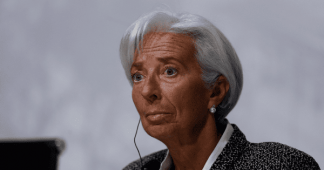Brussels is punishing the poor simply because it can
By Thomas Fazi
November 9, 2021
Much has been said about the supposedly “unprecedented” fiscal measures deployed by the EU during the pandemic. This was supposed to be the start of something new: the birth of a new post-austerity era.
But, although it seems to have slipped the minds of the EU’s finance ministers at their meeting yesterday in Brussels, the truth is that the scope of the bloc’s support package has been wildly overblown. The IMF puts the EU’s discretionary fiscal stimulus at a paltry 3.8% of GDP — a figure dwarfed by the massive discretionary fiscal stimulus of 25.5% of GDP in the US.
The same chasm between narrative and reality can be seen with the much-vaunted Europe-wide “recovery fund” known as Next Generation EU (NGEU). Despite the fanfare, it amounts to barely 5% of the EU’s GDP. What’s more, the funds will be disbursed over the course of six years, resulting in, at best, a fiscal expansion of around 1% of GDP on average between 2021 and 2024. And that’s compared to a GDP loss for the EU as a whole of around 15% just in 2020.
Predictably, the funds come with very strict troika-like conditions attached. They are conditional on compliance with the European Commission’s infamous country-specific recommendations, which in the past have consistently demanded that governments cut public spending — especially on social expenditure (particularly pensions), healthcare and unemployment benefits. This is ultimately what the NGEU is all about: increasing Brussels’s control over the budgetary policies of member states and strengthening the EU’s regime of technocratic and authoritarian control. It’s the EU doing what the EU does best.
So overall we can say that the pandemic has not resulted in any radical rethinking of policy at the European level. Neither has it resulted in any structural change. Indeed, the old fiscal rules are set to be reinstated in 2023. Even though there’s much talk of “reforming the EU’s fiscal rules”, the truth is that everyone knows that serious treaty reform is off the table — as Valdis Dombrovskis, executive vice president of the European Commission, has repeatedly stated.
It’s not just the opposition of the so-called frugal countries — the Netherlands, the Nordic countries, the Baltics and Austria. Anyone who expects a change of heart from the new German government is also bound to be disappointed. Olaf Scholz, Angela Merkel’s successor, is, as Wolfgang Münchau has noted, “a staunch fiscal conservative, on a par with his predecessors, Wolfgang Schäuble and Peer Steinbrück, the Social Democrat behind the debt brake”.
Moreover, regardless of who takes over Jens Weidmann’s role at the Bundesbank, growing inflationary pressures in Germany — in September, inflation hit a 29-year high of 4.1% — mean that fiscal hawks will easily gain the upper hand in the debate. Regardless of the actual cause of inflation (which is largely a result of the massive supply chain disruptions happening around the world), German fiscal hawks will blame it on overspending — with cuts being the only solution.
So, all things considered, we can expect a return of austerity to Europe in the near future. Indeed, it is already taking form. Mario Draghi’s Italy is a case in point. In the current debate, the EU’s most indebted country is often presented as a champion of flexibility and European fiscal reform. However, the reality is quite different. Italy’s latest budget report forecasts a huge deficit reduction — from 10% to 4% of GDP (more than 100 billion euros) in little over a year. Italy’s age of austerity, then, seems far from over.
A return of austerity to Europe as a whole would be devastating, especially given that many countries are still recovering from the post-2008 austerity shock therapy. That experience didn’t just prove to be a colossal failure in economic terms but also led to nothing less than a social and humanitarian catastrophe, particularly in those countries that were subject to the “economic adjustment programmes” (EAPs) demanded by the EU-led troika: Greece, Ireland, Portugal, Spain and Italy (which was never officially in an EAP but saw the imposition of EAP-like policies by former European commissioner Mario Monti, who came to power through an EU-orchestrated “soft coup”).
Numerous reports over the years have confirmed that the budget cuts and tax hikes implemented in these countries disproportionately hit the poor and are directly responsible for a dramatic rise in inequality and unemployment levels (especially among the youth), as well as rates of suicide, poverty (including child poverty), severe material deprivation, homelessness, social exclusion and distress. Even a report from a few years back by the European Parliament’s own employment committee claimed that “the austerity policies and the structural reforms imposed in the troika countries have led to a real social tsunami of massive unemployment (it has tripled in some countries) especially among young people, the closure of hundreds of thousands of companies, mainly SMEs; and a sharp rise in poverty and social exclusion”. These policies have in many respects undermined the very material bases of democracy, leading to social and economic instability.
In recent years, some countries have introduced measures to cushion the effects of austerity. In Italy, for example, the Five Star Movement-League government that emerged from the 2018 elections — which was first and foremost a rebuke of the parties that had administered the disastrous austerity policies — introduced two major policies that went in that direction: a “citizenship income”, a form of income supplement for poor households, and a pension reform lowering the retirement age.
Both those policies are now under threat from the techno-authoritarian government led by Draghi, who is, let us not forget, one of the chief architects of the EU’s post-2008 austerity framework. A new reform raising once again the pension age has already been announced, and the ranks of those in the Government calling for the abolition of the “citizenship income” continue to grow.
This would leave millions of families with no support whatsoever, in an economy that has been ravaged by 18 months of pandemic. But punishing the poorest and weakest members of society for crises they have not caused — first the financial crisis, now the Covid crisis — has long been standard policy, in Italy and elsewhere. As the saying goes, the strong do what they can and the weak suffer what they must.
Published at unherd.com
We remind our readers that publication of articles on our site does not mean that we agree with what is written. Our policy is to publish anything which we consider of interest, so as to assist our readers in forming their opinions. Sometimes we even publish articles with which we totally disagree, since we believe it is important for our readers to be informed on as wide a spectrum of views as possible.











